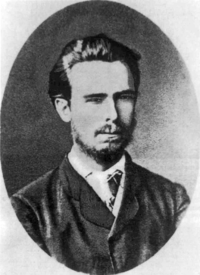1869 manifesto by Sergey Nechayev
| Catechism of a Revolutionary | |
|---|---|
| Created | 1869 |
| Author(s) | Sergey Nechayev |

The Catechism of a Revolutionary is a manifesto written by Russian revolutionary Sergey Nechayev between April and August 1869.
Background
The manifesto is a manual for the formation of secret societies.
It is debated how much input Mikhail Bakunin had or if it is solely the work of Nechayev. The work called for total devotion to a revolutionary lifestyle. Its publication in the Government Herald in July 1871 as the manifesto of the Narodnaya Rasprava secret society ("Общество народной расправы") was one of the most dramatic events of Nechayev's revolutionary life, through its words and the actions it inspired establishing Nechayev's importance for the Nihilist movement.
Content
The Catechism is divided into two sections; General Rules of the Organisation and Rules of Conduct of Revolutionaries, 22 and 26 paragraphs long respectively; abridged versions were published as excerpts in the anarchist periodicals Freiheit and The Alarm.
The most radical document of its age, the Catechism outlined the authors' revolutionary Jacobin program of organisation and discipline, a program that became the backbone of the radical movement in Russia. The revolutionary is portrayed in the Catechism as an amoral avenging angel, an expendable resource in the service of the revolution, committed to any crime or treachery necessary to effect the downfall of the prevailing order.
The revolutionary is a doomed man. He has no private interests, no affairs, sentiments, ties, property nor even a name of his own. His entire being is devoured by one purpose, one thought, one passion - the revolution. Heart and soul, not merely by word but by deed, he has severed every link with the social order and with the entire civilized world; with the laws, good manners, conventions, and morality of that world. He is its merciless enemy and continues to inhabit it with only one purpose - to destroy it.
— Catechism of a Revolutionary, opening lines
Reception
Critics of anarcho-communism argue that the Catechism reflects the innately violent and nihilistic nature of the philosophy. Scholar Michael Allen Gillespie has hailed the Catechism as "a pre-eminent expression of the doctrine of freedom and negation" that arose in the Fichtean notion of the "Absolute I" that had been concealed in Left Hegelianism. Prominent Black Panther of the 20th century Eldridge Cleaver adopted the Catechism as a "revolutionary bible", incorporating it into his daily life to the extent that he employed, in his words, "tactics of ruthlessness in my dealings with everyone with whom I came into contact". The ideas and sentiments in the work had been in part previously aired by Pyotr Zaichnevsky [it] and Nikolai Ishutin in Russia, and by Carbonari and Young Italy in the West.
The journal Cahiers du monde russe et soviétique published a letter from Bakunin to Nechayev, in which Bakunin wrote, "You remember how you were angry with me, when I called you abrek and called your Catechism the Catechism of abreks?"
See also
- Russian nihilist movement
- Anarchism and violence
- Professional revolutionaries
- Demons, an 1872 novel by Fyodor Dostoevsky influenced by the events surrounding the publication of the Catechism.
Footnotes
- Leier, Mark (2006). Bakunin: The Creative Passion. Seven Stories Press. p. 232. ISBN 978-1-58322-894-4.
- Wesson, Robert (1978). Lenin's Legacy. Stanford: Hoover Institution Press, Stanford University. p. 9. ISBN 0-8179-6922-5.
- Heller, Mikhail (1988). Cogs in the Wheel. New York: Knopf. pp. 12. ISBN 0-394-56926-1.
The Catechism of a Revolutionary, a chilling blueprint for the ideal "New Man," was the manifesto of a secret society called The People's Revenge (Narodnaya Rasprava)...
- ^ Avrich p.38
- Crenshaw, Martha (1995). Terrorism in Context. University Park: Pennsylvania State University Press. p. 72. ISBN 0-271-01015-0.
- ^ Gillespie, Michael (1995). Nihilism before Nietzsche. Chicago: University of Chicago Press. pp. 162–163. ISBN 0-226-29347-5.
- ^ Avrich, Paul (1986). The Haymarket Tragedy. Princeton: Princeton University Press. pp. 171. ISBN 0-691-00600-8.
- Moser, Charles (1992). The Cambridge History of Russian Literature. Cambridge: Cambridge University Press. p. 265. ISBN 0-521-42567-0.
- Mclaughlin, Paul (2007). Anarchism and Authority. Aldershot: Ashgate. p. 7. ISBN 978-0-7546-6196-2.
- Avrich p.13
- Avrich, p.37
- Michaël Confino Bakunin et Nečaev Cahiers du monde russe et soviétique Année 1966 Volume 7 Numéro 7-4 pp. 581–699
References
- Avrich, Paul (1990). Anarchist Portraits. Princeton: Princeton University Press. ISBN 0-691-00609-1.
- Yarmolinsky, Avrahm (2014) . "Force and Fraud". Road to Revolution: A Century of Russian Radicalism. Princeton, New Jersey: Princeton University Press. pp. 149–169. ISBN 978-0691610412. OCLC 890439998.
External links